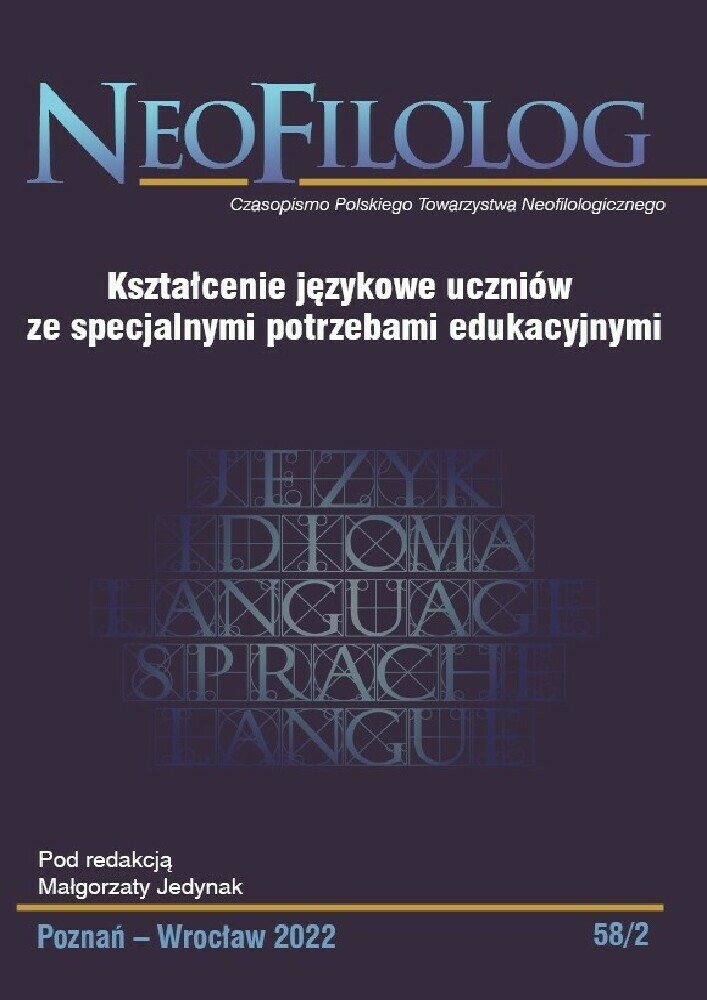Résumé
The 2020/21 academic year proved to be unprecedented in many ways for students and lecturers alike. The need to move from traditional education to a virtual classroom during the Covid-19 pandemic became a stimulus to seek new ways to work and expand knowledge. The aim of this paper is to present the outcome of project work completed by university students of a teaching specialization, which included ways of teaching and ICT tools suitable for working with learners with Special Educational Needs (SEN) in a traditional classroom and in a digital environment. With the increase in remote learning, the challenge of meeting the needs of learners with SEN is considerable. Therefore, inclusive classrooms should be designed with remote learning in mind, so that the teachers are ready to substitute or enrich traditional resources with educational technologies. With the right solutions, teachers can innovate and redefine their classrooms, remodelling them into a mix of face-to face and online delivery. However, different categories of SEN require different solutions. The analysis of the projects confirms that when students are involved in problem-solving and focusing on solutions, they learn more about how to contribute to effective learning in a meaningful way.
Références
Barkley R. A. (2013), What to Expect: The Nature of The Disorder. In Taking Charge of ADHD. The Complete, Authoritative Guide for Parents. Nowy Jork: Guilford Publications, Incorporated.
Bönsch M. (2009), Erfolgreiches Lernen durch Differenzierung im Unterricht. Braunschweig.
Centralna Komisja Egzaminacyjna, CKE (2020a), Komunikat dyrektora Centralnej Komisji Egzaminacyjnej z 20 sierpnia 2020 r. w sprawie szczegółowych sposobów dostosowania warunków i form przeprowadzania egzaminu maturalnego w roku szkolnym 2020/2021. Online: https://www.cke.gov.pl/images/_KOMUNIKATY/20200820%20EM%20Komunikat%20o%20dostosowaniach.pdf [DW 8.02.2022].
Centralna Komisja Egzaminacyjna, CKE (2020b), Komunikat dyrektora Centralnej Komisji Egzaminacyjnej z 20 sierpnia 2020 r. w sprawie szczegółowych sposobów dostosowania warunków i form przeprowadzania egzaminu ósmoklasisty w roku szkolnym 2020/2021. Online: https://cke.gov.pl/images/_KOMUNIKATY/20200820%20E8%20Komunikat%20o%20dostosowani ach.pdf [DW 18.02.2022].
Connor J. (2017), Meeting special educational needs and disabilities: your responsibility. In addressing special educational needs and disability in the curriculum: modern foreign languages. Londyn: Routledge.
Delaney M. (2016), Special Educational Needs. Cambridge: Cambridge University Press.
Jaworska M. (2013), Indywidualizacja procesu nauczania języków obcych a instytucjonalny kontekst edukacyjny. „Lingwistyka Stosowana”, nr 8, s. 43–52.
Jaworska M. (2016), Nauczyciel języka obcego wobec problemu indywidualizacji procesu nauczania. „Orbis Linguarum”, nr 44, s. 289–299.
Król-Gierat, W. (2020), Teaching English to Children with Special Educational Needs. Kraków: Wydawnictwo Naukowe Uniwersytetu Pedagogicznego.
Kubala-Kulpińska, A. (2018), Uwaga, uczeń z dyskalkulią – wsparcie potrzebne od zaraz. „Głos Pedagogiczny”, nr 92. Online: https://www.glospedagogiczny.pl/artykul/uwaga-uczen-z-dyskalkulia-wsparcie-potrzebne-od-zaraz [DW 29.06.2022].
Leons E., Herbert C., Gobbo K. (2009), Students with Learning Disabilities and AD/HD in the Foreign Language Classroom: Supporting Students and Instructors. „Foreign Language Annals”, nr 42, s. 42–54.
Łodej M. (2016), Dyslexia in first and foreign language learning: A cross-linguistic approach. Newcastle upon Tyne, UK: Cambridge Scholars Publishing.
Meyer H. (2004), Was ist guter Unterricht? Berlin: Cornelsen Verlag Scriptor.
Rozporządzenie Ministra Nauki i Szkolnictwa Wyższego z dnia 25 lipca 2019 r. w sprawie standardu kształcenia przygotowującego do wykonywania zawodu nauczyciela, Online: http://isap.sejm.gov.pl/isap.nsf/download.xsp/WDU20190001450/O/D20191450.pdf [DW 21.02.2021].
Rak K. (2021), Differentiated instruction in an inclusive classroom as perceived by the EFL teachers. Niepublikowana praca magisterska. Uniwersytet Pedagogiczny im. KEN w Krakowie.
Skibska J. (2014), Dziecko w młodszym wieku szkolnym z trudnościami w uczeniu się czytania i pisania – doniesienia z badań, (w:) Karpińska A., Zińczuk M. (red.), Dydaktyczna refleksja o edukacyjnych priorytetach. Warszawa: Wydawnictwo Akademickie ŻAK, s. 118–132.
Szczepankowski B. (2009), Wspomaganie rozwoju dziecka niesłyszącego. Audiofonologia pedagogiczna. Warszawa: Wydawnictwo Uniwersytetu im. Kardynała S. Wyszyńskiego.
Tönshoff W. (2004), Binnendifferenzierung im lernerorientierten Fremdsprachenunterricht. „Deutsch als Fremdsprache” nr 4, s. 227–231.
Wdówik P. (2010), Technologie asystujące dla uczniów niewidomych w zakresie czytania i pisania, (w:) Witczak-Nawotna J. (red.), Wspomaganie uczniów z dysfunkcją wzroku w szkołach ogólnodostępnych. Wybrane zagadnienia. Warszawa: Biuro ds. Osób Niepełnosprawnych Uniwersytetu Warszawskiego, s. 61–60. Online: http://henrykl.home.amu.edu.pl/Publikacja/wspomaganie_uczniow.pdf [DW 28.06.2022].
Zawadzka-Bartnik E. (2010). Nauczyciel języków obcych i jego niepełnosprawni uczniowie (z zaburzeniami i dysfunkcjami). Kraków: Oficyna Wydawnicza „Impuls”.
Licence
© Werona Król-Gierat, Katarzyna Rak 2022

Ce travail est disponible sous licence Creative Commons Attribution - Pas de Modification 4.0 International.
Auteurs :
Les auteurs de textes acceptés pour publication dans la revue Neofilolog sont tenus de remplir, signer et renvoyer à l'adresse de la rédaction, un accord sur l'octroi d'une licence gratuite pour les œuvres, avec obligation d'accorder une sous-licence CC.
En vertu de cet accord, les auteurs des textes publiés dans la revue Neofilolog accordent à l'Université Adam Mickiewicz de Poznań une licence non exclusive et gratuite et permettent l'utilisation de la sous-licence Creative Commons Attribution-NoDerivatives 4.0 International (CC BY-ND 4.0).
Les auteurs se réservent le droit de disposer librement de l'œuvre.
Utilisateurs :
Les utilisateurs d'Internet intéressés ont le droit d'utiliser les œuvres publiées à partir de l'année 2017 sous réserve des conditions suivantes :
- reconnaissance de la qualité d'auteur - l'obligation de fournir des informations sur la qualité d'auteur, le titre, la source (liens vers l'œuvre originale, DOI) et la licence, ainsi que l'œuvre distribuée ;
- sans créer d'œuvres dérivées - l'œuvre doit être conservée dans sa forme originale, p. ex. les traductions ou les interprétations ne peuvent être distribuées sans le consentement de l'auteur.
Tous les textes publiés sont soumis au droit d'auteur.
Autres :
L'Université Adam Mickiewicz de Poznań se réserve le droit à la revue dans son ensemble (mise en page, forme graphique, titre, conception de la couverture, logo, etc.).
.

